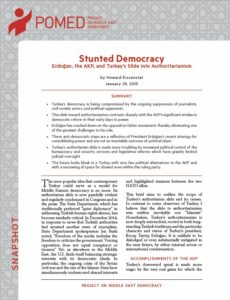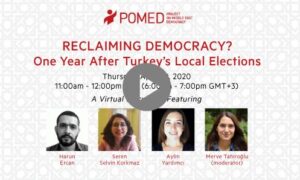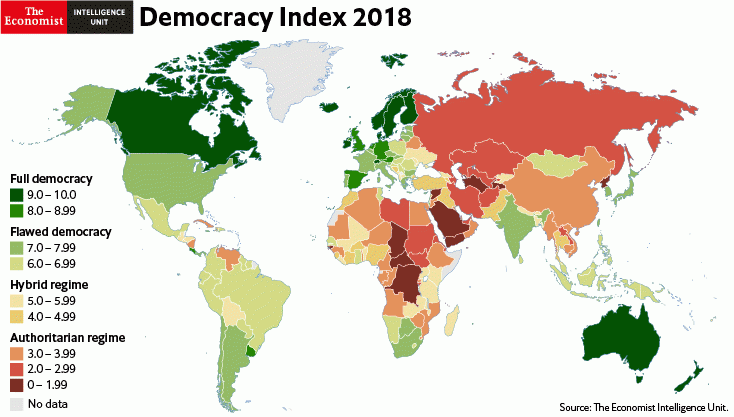Serious backsliding in democratic standards, rule of law and fundamental freedoms continued in the absence of effective checks and balances, said the European Commission’s “2020 Report on Turkey,” published on Tuesday.
Turkish authorities continue to pressure civil society, aid groups and the media, and political power is still being concentrated in the hands of President Recep Tayyip Erdogan. The adverse impact of a state of emergency declared by the Turkish government in July 2016 after an abortive coup continued to significantly impact democracy in large part because “certain legal provisions granting extraordinary powers to the government authorities and retaining several restrictive elements of the emergency rule have been integrated into law.”
A post-Erdogan Turkey: much ado about nothing | Iain MacGillivray | https://t.co/sMHSfyiUJ5 via @aspi_org
— Democracy Digest (@demdigest) October 8, 2020
Turkey’s negotiations on joining the world’s biggest trade bloc shouldn’t be accelerated because of its failure to uphold democratic standards, protect the independence of its courts and effectively fight corruption, said the scathing report on Ankara’s progress toward EU membership.

Credit: POMED
Civil society’s space to operate freely has continued to diminish, the report noted:
The Gezi trial and the continued pre-trial detention of Osman Kavala, despite the existence of a ruling of the European Court of Human Rights calling on his release, had a deterrent effect. Administrative difficulties for national and international non-governmental organisations (NGOs) continued to hamper civil society activities. Civil society organisations remained excluded from genuine legislative consultation processes.
The return of a popular opposition challenges the final consolidation of authoritarianism by the AKP and its cronies, says analyst Iain MacGillivray. The regime is looking tired, unable to muster the will to address the economic ills the country faces. Its foreign policy adventurism and aggressive posturing make it look less like a ruling regime on the rise and more like a strategically directionless elite. But despite the AKP’s many missteps, a transition back to democracy won’t be easy, he writes for ASPI’s The Strategist:
 The polarisation of Turkish society and deterioration of both the formal and informal norms of democracy will take time to heal. On the economic front, Turkey will need to break away from populist economic policies that favour regime loyalists. If it doesn’t, the combination of economic cronyism and an increasingly pugilistic foreign policy is likely to continue to scare away the vital foreign investment from Europe and the US that underwrites Turkey’s economy. …Another complicating factor is the Kurdish issue. Until a viable solution is brokered, the conflict will continue to feed the country’s authoritarian dynamics.
The polarisation of Turkish society and deterioration of both the formal and informal norms of democracy will take time to heal. On the economic front, Turkey will need to break away from populist economic policies that favour regime loyalists. If it doesn’t, the combination of economic cronyism and an increasingly pugilistic foreign policy is likely to continue to scare away the vital foreign investment from Europe and the US that underwrites Turkey’s economy. …Another complicating factor is the Kurdish issue. Until a viable solution is brokered, the conflict will continue to feed the country’s authoritarian dynamics.
Turkey’s government has used the Covid pandemic “as an excuse for the already oppressive government to do things that it has long planned to do, but had not been able to,” said a respondent to the Freedom House survey, Democracy Under Lockdown.
 Turkey’s foreign policy has also “become a hostage to Erdoğan’s personal interests at home,” said Merve Tahiroğlu (right) of the Project on Middle East Democracy (POMED), and a Penn Kemble Fellow at the National Endowment for Democracy. “Those interests are now fanning the flames of hyper-nationalism and polarisation, while making people feel like they are under attack from external and internal enemies. This is how the Erdoğan government thrives and survives.”
Turkey’s foreign policy has also “become a hostage to Erdoğan’s personal interests at home,” said Merve Tahiroğlu (right) of the Project on Middle East Democracy (POMED), and a Penn Kemble Fellow at the National Endowment for Democracy. “Those interests are now fanning the flames of hyper-nationalism and polarisation, while making people feel like they are under attack from external and internal enemies. This is how the Erdoğan government thrives and survives.”
Erdoğan envisions Turkey leading a non-sectarian, populist Islamic wave against “the old powers of the West,” which constitutes the final focus of the country’s foreign policy under two decades of AKP governments, i.e., a broad stance against American and Western Hegemony, adds POMED’s Howard Eissenstat.
Turkey’s support for Venezuela and efforts to expand the United Nations Security council to include non-Western entities are based on Erdoğan’s view that the West is “fundamentally hypocritical and declining in power,” he said. “This view has shaped both the aggressive nature of Erdoğan’s foreign policy and his ambitions for a new leadership role for Turkey in an emerging multipolar system.”
Turkey ranks 110th among 160 countries in The Economist’s democracy index.








